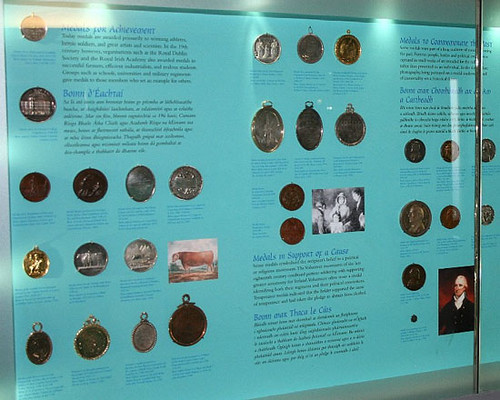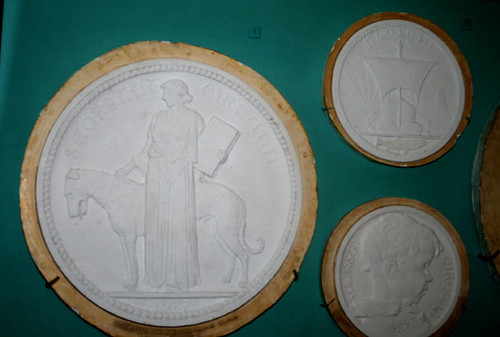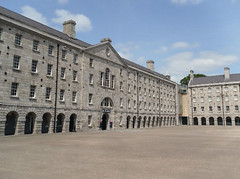
PREV ARTICLE
NEXT ARTICLE
FULL ISSUE
PREV FULL ISSUE
NUMISMATICS AT THE NATIONAL MUSEUM OF IRELAND
Michael Alexander published a great article on Coin Update about his visit to the National Museum of Ireland in Dublin. It's lengthy and well illustrated - be sure to read the whole version on the web. Here's a short excerpt.
-Editor
An interesting fact about Irish coins is that they do have a similar timeline as those of several Scandinavian countries such as Sweden, Norway and Denmark. There are coins on display which can be dated to the very last years of the first millennium, around 998 and right up to the most recent coins denominated in Euro. The collections are displayed in well-lit, welcoming and spacious surroundings. As you enter the complex where the collection is housed, you are met with a real piece of Irish numismatic history, the very plaster mould which Croatian sculptor Ivan Mestrovich (1883-1962) submitted to the Irish coinage committee in 1927 but, as the story goes, the model arrived too late for consideration. This beautiful depiction of an allegorical female figure with harp most probably would have been utilized for the common reverse sides of Irish national coinage – and as it turned out, the design was adopted and used as the great seal of the Central Bank in 1965. This extraordinary object of numismatic art eventually did make its way onto an Irish coin (as had been intended) in 2007 when a silver commemorative coin was issued for collectors. Another room which is part of the collection contains an extensive collection of Irish and world medals, including an actual gold Nobel Prize medal. The national collection includes several pieces of the coins issued under King Henry VIII, Mary I and Elizabeth I. Henry’s Groat or silver four pence is on display as well as Mary’s & Elizabeth’s shillings – all carrying the now familiar harp on the reverse of the coins – a tradition which continues to this day.

Impressive selection of medals covering pre and post-independence, the subjects are wide ranging. During the period of the Great Rebellion in Ireland and the English Civil War a number of crudely made coins were produced in Ireland, mostly in Dublin. These coins were almost exclusively of silver plate cut and struck into a number of denominations with simple patterns which often included their weight or value in their design. Of interest is a display of “Blacksmith’s money” which was minted during the Cromwell era. Included is an excellent example of a Kilkenny half-crown based on the English coin of the same denomination – the differences could not be more startling! Another fascinating inclusion is that of the Ormond pieces, issued by the Lord Justice the Earl of Ormond in about 1642-1645.

Exquisite original plaster molds of proposed coin designs that might have been…
To read the complete article, see:
The Coins of the National Museum of Ireland
(news.coinupdate.com/the-coins-of-the-national-museum-of-ireland-2127/)
The Numismatic Bibliomania Society is a non-profit organization promoting numismatic literature. See our web site at coinbooks.org. To submit items for publication in The E-Sylum, write to the Editor at this address: whomren@gmail.com To subscribe go to: https://my.binhost.com/lists/listinfo/esylum All Rights Reserved. NBS Home Page Contact the NBS webmaster 
|
